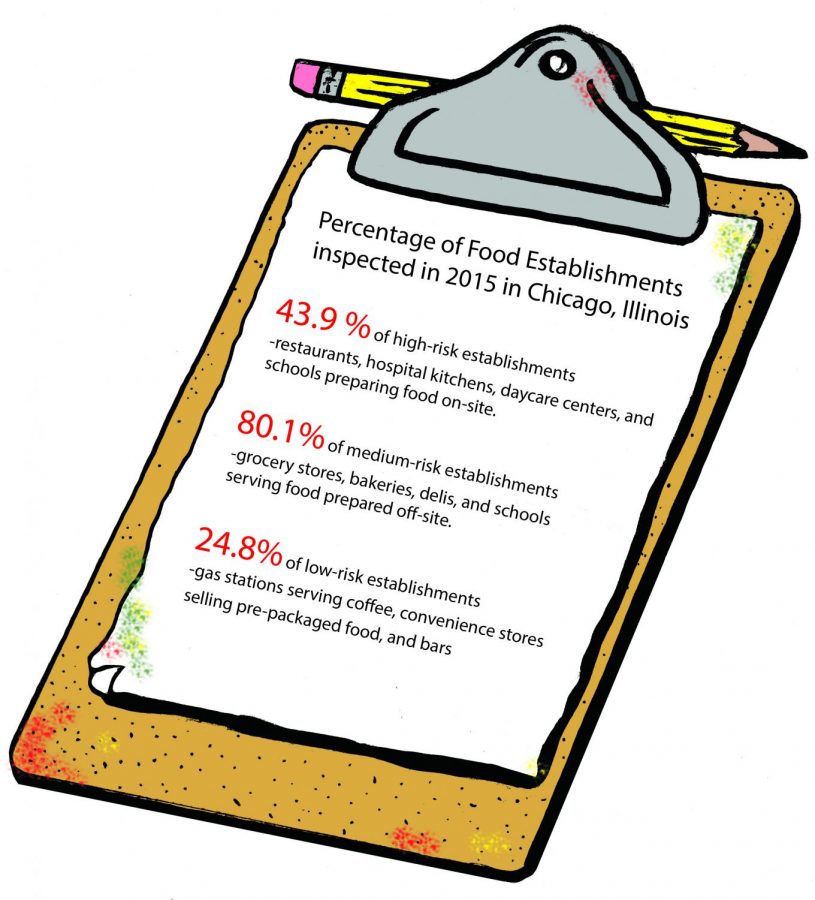Too many restaurants, not enough city health staff
Too many restaurants, not enough city health staff
December 12, 2016
Fewer than half of Chicago’s restaurants are inspected as often as required by state law and the Chicago Department of Health, according to an audit that City of Chicago Office of Inspector General Joseph Ferguson released Nov. 28.
The health department’s rules and regulations state that high-risk establishments, including restaurants, hospital kitchens and schools, must be inspected twice annually. Medium-risk establishments like grocery stores, must be inspected once per year; low-risk establishments like bars must be inspected once every two years.
However, the report stated that the department inspected less than half of high-risk establishments at least twice in 2015; just over 80 percent of medium-risk establishments at least once in 2015; and less than 30 percent of low-risk establishments at least once in 2014 or 2015.
“[The office is] not testing to see whether inspections are necessary, we are just going in and looking at [whether] the city is doing what it says it is doing,” said Rachel Leven, spokeswoman for the Office of the Inspector General. “According to what [the city’s] rules are, it is not meeting
those targets.”
However, the audit found the department conducted timely re-inspections when violations were identified during initial inspections and in response to any public complaints about establishments.
The audit concluded that a lack of health department inspectors caused reduced inspections. The department currently has 38 inspectors, and the audit estimated at least 56 additional inspectors are needed to conduct the legally required number of food inspections. The audit also suggests that failure to meet state inspection standards places annual state funding at risk.
The Chicago Department of Public Health was quoted in the audit saying it will work with the Illinois Department of Public Health to develop a permanent inspection schedule that is “feasible to execute and sufficiently rigorous to promote food safety.”
Adrianna Morales, a 19-year-old Roosevelt University student, said most Chicago restaurants are clean, despite the audit’s findings.
“It just depends on the restaurant and how often the higher-ups are checking in to each location,” Morales said.
It is recommended by the Food and Drug Administration that high-risk establishments be inspected once every six months, while Chicago’s rule for high-risk establishments requires the second inspection to be at least 90 days after the first. High-risk establishments are inspected three times annually in Los Angeles and once every 72 days in Houston, according to the audit.
“While we appreciate the Inspector General’s review, Chicagoans can have confidence that their food is safe because it was prepared in a sanitary kitchen, thanks to the work our health inspectors do to ensure restaurants and establishments across the city meet the health code,” said City Hall spokesperson Lauren Huffman in a Dec. 9 emailed statement. “We are committed to keeping our restaurants clean and our residents safe from food-borne illnesses, despite the fact that we have long faced a lack of appropriate funding by the state to meet their own requirements.”
IDPH, Illinois Restaurant Association and Chicago Department of Public Health could not be reached for comment as of press time.
Dannel Mitchell, a 38-year-old Chicago resident, said he thinks city restaurants should be inspected once a month.
“Usually, [restaurant employees] do their job,” Mitchell said. “However, they do not do their job the way they are supposed to do it because people are not babysitting them or laying down the law.”
………. CORRECTION Monday, Dec. 12 at 12 p.m.: The City of Chicago Office of Inspector General spokeswoman’s name was originally incorrectly spelled as “Rachel Levin” when the correct spelling is “Rachel Leven.”








